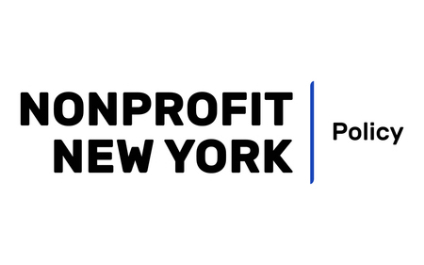CAN: Campaign to Advance Nonprofits
Nonprofit New York’s Public Policy Platform
Nonprofit New York is thrilled to launch our overarching policy campaign, CAN: the Campaign to Advance Nonprofits. CAN is Nonprofit New York’s public policy* agenda, based on our Declaration of Nonprofit Rights. In order to ensure the nonprofit sector’s continued vibrancy, strength and capacity, Nonprofit New York will protect, uphold and sustain the following four principles: 1) we have the right sustainable resources and a responsibility to serve our communities well, 2) we have a right to engage in advocacy and a responsibility to share our expertise, 3) we have a right to be fairly treated as a workforce and a responsibility to champion equity, and 4) we have a right to be powerful forces of change and a responsibility to advance the future of all communities. Nonprofit New York held a series of policy roundtables with stakeholders representing various sub sectors, conducted research and literature reviews, and worked with our Board Policy Committee to develop our policy platform. Parts of the policy platform will take multiple years to achieve, while others will be specific to fiscal years or legislative sessions.
Campaign to Advance Nonprofits
1. Sustainable nonprofits initiative
Nonprofit New York seeks to fundamentally change the way nonprofits in New York are resourced. The Sustainable Nonprofits Initiative will empower the sector with tools for understanding their actual costs, advocate that funders reform practices to fully fund nonprofits’ work, and serve as a filter for taking positions on legislation that will either support or weaken nonprofits’ financial position. The campaign seeks to:
- Understand the nonprofit sector’s financial health through quantitative and qualitative research to inform our advocacy efforts
- Build capacity of nonprofits to calculate their actual costs, including funding for full operating (direct and indirect) costs, livable wages and benefits, professional development, fundraising, reserves, capital investments, proactive solutions, and innovation
- Educate and unite organizations on funding needs to be financially resilient
- Educate the public, funders, and government on actual funding needs; reframe the narrative – and the model budget – that suggests program expense and indirect ratios are good benchmarks of effectiveness
- Advocate that all funders adopt new funding models and unite the sector in implementing sustainable funding structures
2. Sector promotion and nonprofit advocacy
- State of the Sector: Nonprofit New York, in partnership with the Baruch Center for Nonprofit Strategy and Management, will promote nonprofits for the important role they play in civil society, with research on the state of the sector and its impact.
- Amplifying Community Voices: Nonprofit New York will advocate for legislation and resources for nonprofits to engage in advocacy and share their expertise in the policymaking process.
3. Nonprofit racial equity
Nonprofit New York will continue our work with nonprofit capacity builders in the New York City area to develop tools for organizational development that advance racial equity to address racial disparities within the sector. Nonprofit New York will also support legislation and policies to promote racial equity within the sector.
Legislation
-
1. Raise the “lobbying threshold”: FY20 launch
Increase the state lobbying threshold to $10,000 to encourage more grassroots nonprofit organizations to engage in legislative advocacy, through the Amplifying Community Voices campaign.
2. Financial impact assessments: FY20
Advocate that the city and state incorporate a financial impact assessment for nonprofits into legislative efforts.
3. Sustainable funding legislation: FY 21 – 22
Based on findings from the Sustainable Nonprofits initiative, support legislation that will strengthen nonprofits’ financial sustainability.
4. Nonprofit Equity: FY21
Conduct a feasibility study on certifying nonprofits as Minority or Women-Owned Business Enterprises (MWBE) to allow nonprofits to obtain MWBE contracts and track how contracting and public funds are reaching marginalized communities.
5. Charitable giving: FY22
Increase incentives for charitable giving through “above the line giving” at state and federal levels.
Research
-
1. State of the sector: FY20
Conduct research on the state of the nonprofit sector in New York as well as the impact of the sector to provide public education on the importance of nonprofits.
2. Nonprofit financial health: FY 21 – 22
Nonprofit New York will conduct research on the financial health of the nonprofit sector in New York City to inform our Sustainable Nonprofits initiative.
3. Equity within the sector: FY 21 – 22
Nonprofit New York will research the state of equity within the sector, including standards for livable wages and benefits, current salaries and benefits of the workforce, the burden of student debt, and disparities across abilities and demographic categories.
In addition to the above priorities, Nonprofit New York will monitor legislation that will have an impact on the sector and take positions in support or against legislation for the sector using our framework of the Declaration of Nonprofit Rights. Nonprofit New York may also engage in supportive policy efforts that others are leading, such as Census 2020 readiness for nonprofit organizations, contract reform advocacy, and city and state capital funding reform.
*Nonprofit New York understands nonprofit public policy to include both the legislation and regulations that govern the nonprofit sector, and the non-legislative policies and aspirations that impact the sector’s culture, norms, and expectations. Nonprofit New York’s public policy work includes legislative priorities and macro-level efforts to influence philanthropy, business, and the sector as a whole. We endeavor to take on issues that are sector-wide, that have significant impact on nonprofits that are not being led by other organizations, and in places where others do not have the bandwidth to address the issue.

